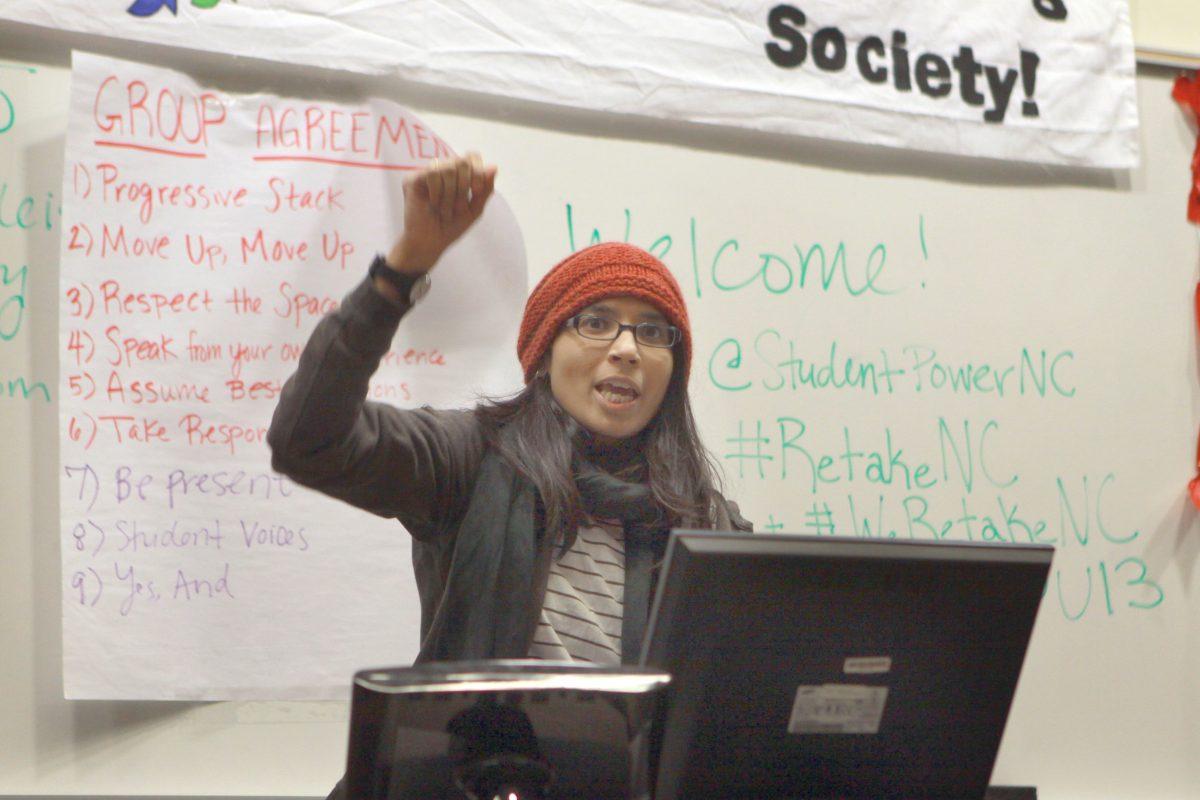 Rushdia Mereen; orgnaizer of the Quebec Student Movement; delivers the keynote speech at the Student Power Union Conference on Saturday." />
Rushdia Mereen; orgnaizer of the Quebec Student Movement; delivers the keynote speech at the Student Power Union Conference on Saturday." />
Rushdia Mereen; orgnaizer of the Quebec Student Movement; delivers the keynote speech at the Student Power Union Conference on Saturday.
The N.C. Student Power Union held its annual conference at N.C. State on Saturday in an attempt to put education back in students’ hands.
The conference, titled “Retaking our Schools, Remaking Society!” led discussions on education, labor unions and other public services. The event included speeches, such as the keynote address by Rushia Mehreen, organizer of the Quebec Student Strike, as well as a panel discussion and various workshops. While a march on the Civitas Institute, a conservative think tank, had been planned, it was canceled due to inclement weather.
The conference brought together 187 students from across the state, with 14 different constituents of the UNC system represented.
The Union claimed those in power are threatening the education system at students’ expense. Members specifically cited increases in tuition, an increase in online classes and Gov. Pat McCrory’s recentcomments about limiting funding for liberal arts schools as reasons for assembling.
UNC-Chapel Hill alum, Ana Maria Reichenbach, claims these changes are being made without student input.
“It’s all up to the administration,” Reichenbach said. “There’s no space (in the Board of Governors) for student input…(The NCSPU) is about refusing to take the miniscule ways that the administration and society try to control us.”
Bryan Perlmutter, a senior in business administration and member of N.C. Student Power Union, discussed issues regarding tuition, student debt and a multimillionaire’s attempt to influence North Carolina’s politics.
College tuition has doubled in the last 10 years and collective student debt is over a trillion dollars, Perlmutter said.
Perlmutter also said wealthy businessman and Gov. McCrory’s budget director, Art Pope, are a threat to students in N.C.
Pope has invested millions to think tanks and advocacy groups that are designed to further conservative and free market ideas, according to The News and Observer.
These organizations include Americans for Prosperity, the John Locke Foundation and the John William Pope Center for Higher Education Policy.
In 2011, The New Yorker, ran a 10 page centerpiece detailing the extent of Pope’s influence in not only elections at the state and federal levels, but his attempt to instill conservative politicians at the municipal and countywide levels.
According to Perlmutter, Pope is using his money to influence the Wake County School Board, by funding the candidates who’s platforms align with his ideals.
Additionally, Pope wants to increase tuition while decreasing financial aid, federal funding for schools and unemployment benefits, said Perlmutter.
M.J. Braun, an assistant professor of rhetoric at UNC-Pembroke, said some trends in higher education that could mean trouble for students.
Massive Open Online Courses are growing in popularity and many students take these courses because they do not have other options. Online classes are a harmful alternative to live classroom experiences, which are critical to a student’s education, said Braun.
Braun said hefty fees are required for many MOOC but the fees will be dropped once they are implemented on a large scale. In addition to more online classes, an increase in standardized testing will negatively affect higher education.
“(College) will be just like high school,” Braun said. “Teachers will teach to the test, getting rid of all critical content from university education.”
Ashaki Binta, member of the Black Workers For Justice, discussed labor unions and how they are at risk. According to Binta, right-wing legislatures are trying make unions illegal.
The 14 to 15 million people in labor unions are a power that needs to be harnessed because they give the average person a voice, Binta says.
“Students and workers working together have the potential to make a change,” Binta said. “It’s going to take an organized struggle to fight back against this. Just because (the N.C. Government, big business and the administration) are in power doesn’t mean they’ll win anything.”
Hannah Allison, a graduate student at N.C. State in social work, agreed with the panel discussion, and hopes for more student input in the future.
“No Republican or Democrat works for (students) unless we demand they do,” Allison said. “We are here to create a North Carolina where education is publically accessible to all.”